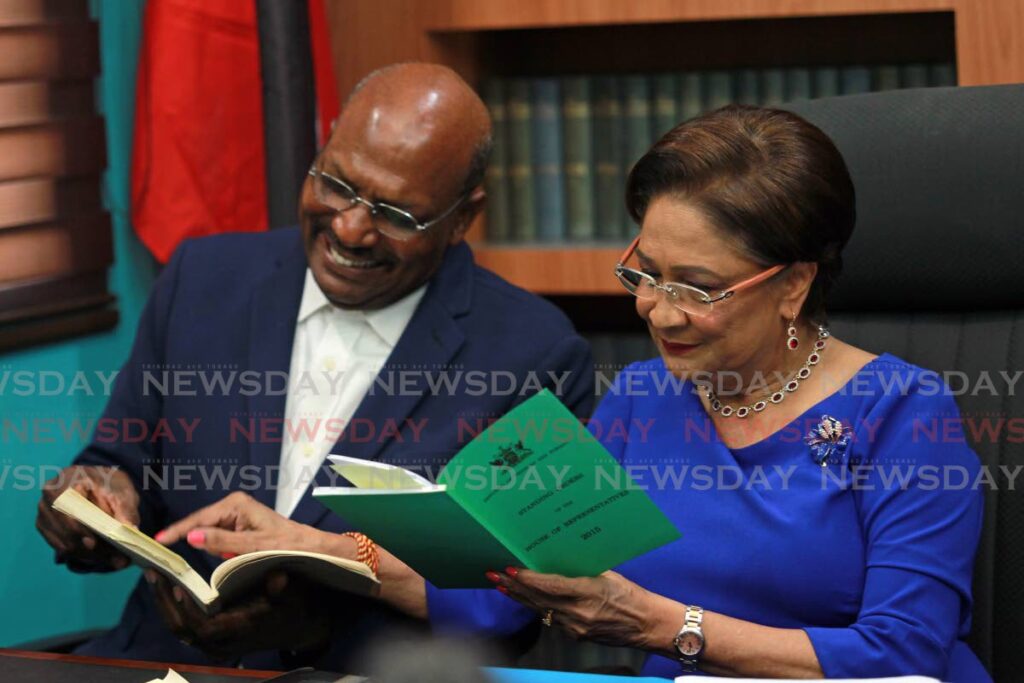Kamla: Government can't recall Parliament to change procurement law

OPPOSITION Leader Kamla Persad-Bissessar said Government does not have the power to recall Parliament to make urgent changes to the Procurement Act.
Addressing a PNM meeting in Tunapuna on Thursday, the Prime Minister said he instructed Leader of Government Business Camille Robinson-Regis to recall the House of Representatives on July 19 to make amendments to the procurement legislation.
The Senate will also be required to sit to deal with this matter.
Speaking at a news conference at her constituency office in Penal on Friday, Persad-Bissessar said, "This government has consistently acted illegally."
"Parliamentarians are lawmakers, not lawbreakers."
She added, "This is another example of law-breaking."
Persad-Bissessar said this pattern began last year when Government extended the life of local government bodies by one year to facilitate local government reform.
As a result, local government elections (which were then due by March 2023) were postponed to March 2024.
In its judgment on May 18, the Privy Council said the extension of the life of local government bodies was unlawful. But it did not deem the extension a constitutional breach or that it deprived people of the right to vote.
As a result of the judgment, Dr Rowley announced that the elections would on August 14.
Persad-Bissessar said, "It is our view that they are breaking the law once again by saying that Camille Robinson-Regis is instructed to recall the Parliament."
She referred to the House's standing orders, the Constitution and Erskine May's Parliamentary Practice to support her argument.
Under the doctrine of separation of powers, Persad-Bissessar said Rowley cannot instruct the Judiciary how to conduct its affairs.
"In the same way, the Prime Minister cannot instruct that the leader of government business recalls the Parliament at a time when we are in a recess.
Persad-Bissessar reminded the media that the House's standing orders were connected to Section 56 (1) of the Constitution which allows the House and Senate to regulate their respective affairs.
Standing order 14 states the House will be in fixed recess annually, from the first week in July to the first week in September. The Senate's standing orders cater for the same recess.
While the Parliament is in recess, Persad-Bissessar said, "We are in the middle of a local government election campaign."
She had no idea what were the Government's intentions in having Parliament reconvened now.
"He (Rowley) says amendments to the procurement law."
The Opposition, Persad-Bissessar continued, cannot properly address those amendments or make counter proposals if they don't know what those amendments are.
Referring to two legal notices approved by Finance Minister Colm Imbert to approve exemptions to the procurement act, Persad-Bissessar said, "We caught them in a sense with their hands in the cookie jar."
She believed the amendments that Government will bring next week will help them "to put their hands deeper down inside of the cookie jar."
Persad-Bissessar reiterated the UNC's view that the exemptions were to give contracts to PNM financiers to fund the PNM's local government election campaign.
"Nobody knows who will be paid? How many persons will be paid? The amounts that will be paid?"
She wondered if this would involve bribes being paid to contractors. Persad-Bissessar reiterated questions from the UNC about how the PNM was funding the rebuilding of its Balisier House headquarters in Port of Spain.
Persad-Bissessar praised the diligence of Barataria/San Juan MP Saddam Hosein for raising this matter and letting the public know that such exemptions needed the affirmative resolution of Parliament.
"There is a fundamental change to what the whole purpose of the procurement law is about and should be about."
While extraordinary sittings of Parliament are allowed during its fixed recess, Persad-Bissessar said only House Speaker Bridgid Annisette-George has the power to recall the House during that time.
This is reflected in House standing order 13.
Persad-Bissessar was confident that Rowley would convince Annisette-George of the need for the House to sit.
"The Speaker is their (PNM) speaker."
Reiterating that Robinson-Regis cannot summon Parliament, Persad-Bissessar said, "If Camille (Robinson-Regis) sends me a notice to come to Parliament, I am not going."
She expected that the procurement law could be further watered down by the Government next week.
"They are totally against transparency and accountability in government affairs."
With the Senate expected to be recalled as well to deal with this matter, Persad-Bissessar said Rowley indicated that Government will use its majority in the House to approve the amended procurement law.
She had one message to give to the nine independent senators when the matter comes to the Senate.
"Continue to be as independent as you always seem to be."
Opposition Senator Wade Mark, a former House speaker, supported Persad-Bissessar's position.
He recalled two instances under the former UNC-led People's Partnership coalition government in 2014 when Parliament was recalled during its fixed recess to deal with urgent matters.
Mark said the provisions of standing order 13 were used in both cases.

Comments
"Kamla: Government can’t recall Parliament to change procurement law"